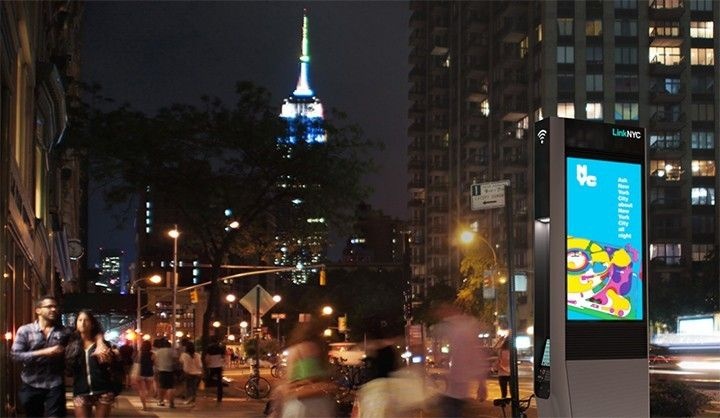- February 10, 2016
- Infrastructure
A version of this column originally appeared on Governing.com.
The streets of New York City are one step closer to superfast public Wi-Fi. LinkNYC, a public-private partnership between the City and a consortium of tech companies, has debuted its first payphone-turned-tech kiosks in Manhattan. These street-side “Links” contain Wi-Fi beacons, mobile device chargers, informational tablets, and a keypad-intercom that can place phone calls anywhere in the US for free. The city plans to roll out 500 more by July, and at least 4,550 will be spread across the five boroughs by 2020.
The New Yorker’s “Talk of the Town” reports that the first Link “is made mostly of shiny, extra-tough aluminum, has the shape of a hockey-stick blade, and gleams like a futuristic monolith.” Advertisements, which change every 15 seconds, light up 55” HD screens on either side of the beacons. The revenue from these ads make the program financially feasible and will be split between the City and CityBridge, the designer and operator of the Links. The City is guaranteed, by contract, at least $500 million over the next 12 years.
This ad space is so valuable because of the user information (including IP addresses, GPS location, and browsing data) that feeds the Links. This data allows advertisers to deliver highly targeted content to passersby. The back end functions similarly to ad-targeting algorithms users find while surfing the web, which is leading some to raise questions about privacy.
In a recent article in The Conversation, Benjamin Dean, who researches Internet governance and cybersecurity at Columbia University, wrote that “far from being free, use of LinkNYC comes with the price of mandatory collection of potentially sensitive personal, locational and behavioral data.” To underscore this point, he cites a Pew Research Center survey in which nine in ten adults said that “being in control of what information is collected about them is important.”
As partnerships of this sort become commonplace, cities have an opportunity to raise the bar and chart a path as careful stewards of citizen information.
Information autonomy is important, which is why LinkNYC has a transparent, customer-first privacy policy that ensures no personally identifiable information is shared outside of CityBridge. What’s more – another, more recent Pew Report finds that “there are a variety of circumstances under which many Americans would share personal information or permit surveillance in return for getting something of perceived value.” That “something” might be a social media platform, a search engine – or ubiquitous wireless internet that is 100 times faster than average public Wi-Fi.
To echo the Pew report, free is a good price.
As with all public services, users assume some risk. Even with the cybersecurity protections CityBridge has built into the Links, it still falls on users to make informed choices when connecting to new internet providers. As Joanna Stern put it in a recent Wall Street Journal video feature on LinkNYC, “You wouldn’t use a public toilet without the proper precautions. Don’t use a public hotspot without them, either.”
Certainly privacy is a real concern in any public-private partnership involving citizen data. High-profile data breaches at the federal level and concerns over exploitative corporate data-mining practices have rightly elicited unease. But municipal governments have sustained a good track record so far. As partnerships of this sort become commonplace, cities have an opportunity to raise the bar and chart a path as careful stewards of citizen information.
It remains to be seen whether LinkNYC’s privacy protections will be as customer-focused as promised. But if it holds up, it will be a big win for the de Blasio administration’s tech agenda. This strategy aims to leverage value over a network of public and private resources to advance the city’s tech ecosystem in a common direction, whether in municipal agencies, emerging start-ups in “Silicon Alley,” schools in underserved communities, or – yes, the curbs of city sidewalks.
This column is part of a Better, Faster, Cheaper series following the ways in which states and municipalities are reimagining public infrastructure as an underdeveloped resource.
Top photo credit Flickr/Pierre Lecourt


 Craig Campbell is the Assistant Director for Policy & Operations for the NYC Mayor’s Office of Data Analytics (MODA). Prior to working for the City of New York, Craig researched trends in municipal data analytics, supporting several national policy networks and research programs at the Ash Center for Democratic Governance and Innovation at Harvard Kennedy School. Craig holds a degree in architecture and mathematics from Amherst College.
Craig Campbell is the Assistant Director for Policy & Operations for the NYC Mayor’s Office of Data Analytics (MODA). Prior to working for the City of New York, Craig researched trends in municipal data analytics, supporting several national policy networks and research programs at the Ash Center for Democratic Governance and Innovation at Harvard Kennedy School. Craig holds a degree in architecture and mathematics from Amherst College.

